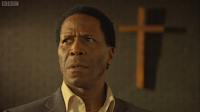Waterloo Road, Season 8 Episode 2 (Spirit Child)
Gerard Findlay (Antagonist)
Gerard Findlay is the Headteacher of Haverlock High. He has a feud against Michael Byrne, the Headteacher of Waterloo Road. In this episode he actually helps Mr Budgen respay his car after it has been vandalised by students of Haverlock and he doesn't want Grantley to get the police involved.
Lula (Neutral, but mainly a victim so we feel sympathy towards her)
This episode is the first time we see Lula. At first she is presented as coming from a stereotypical African family where her uncle doesn't speak English. She is a very mixed character who we gain sympathy for due to the way she is harshly treated by her Uncle and the pastor.
Mr Byrne (Protagonist)
Mr Byrne is very quiet in this episode. He doesn't do too much other than tell Grantley not to tell the police as he doesn't want to cause trouble between Waterloo Road and Haverlock High.
Lula's Uncle (Antagonist)
Lula's Uncle is immediatly shown as being a vicious figure. We see from the start that he scares Lula, and he won't listen to what she wants. He is very religious and doesn't believe in any other methods for trying to help Lula. He is also very vicious towards the teachers at the school.
Tom Clarkson (Protagonist)
Mr Clarkson is presented as a bit of a hero in this episode. Despite what happens to Lula he doesn't give up on trying to help her, and he manages to persuade Lula's Mum to come and rescue her from her Uncle and the Pastor.
Lula's Mum (Antagonist)
Lula's Mum is very quiet in this episode. At first she appears as being very ill, but we later see that Lula's Uncle is actually trying to control her, and that despite what we previously hear she can speak English and she helps Lula out and gets rid of Lula's Uncle.
Connor Mulgrew (Neutral)
Connor is a bit of a troublemaker. He tries to get his mum caught out after having Vodka in school, but then he owns up because he feels guilty. At the end of the episode he accidently sets the house on fire, and because his mum is recovering from drinking he tries to pin the blame onto her.
Christine Mulgrew (Neutral)
Christine is a teacher who has a drink problem. She is caught with alcohol in the school but her son takes the blame for her. At the end of the episode Connor sets the house on fire accidently and blames in on Christine.
In this episode we see the conflict between the binary opposites. According to Levi-Strauss most films and TV Dramas are based around conflict between binary opposites. Hero V Villain, Good v Evil and Love v Duty. In this episode Lula and her Uncle are the opposites and stand for Good v Evil. As is usually the case with most TV shows and films good eventually triumphs over evil, despite always looking like evil will come out on top. The story follows a linear structure, where it is all in chronological order. The clips all work as a chain, with something in between the seperate storylines which develop through the storyline. These include Connor and his Mum's drink problem, where Connor accidentally sets his house on fire and Gerard Findley and Michael Bryne's Feud over Waterloo Road and Haverlock High.
We see Love as a duty of care reversed. Normally we'd expect the uncle to be the one showing love towards his niece, but what we actually see happening is Tom loving Lula and showing her care and the Uncle not really being interested. This is a role reversal which helps Mr Clarkson look like a hero. This helps to provide the ending, when Tom managed to get Lula's Mum in just in time and manages to to prevent the exorcism and allow Lula and her Mum to restart their relationship with one another.
This episode manages to fit in with Todorov's theory of narrative equilibrium. We have an Equilibrium where Lula is starting at school, however this doesn't last long before she is already causing trouble by stepping out in front of Mr Clarkson's car. The disruption starts fully when other students try to interact with Lula, she reacts very badly to it and causes problems. Lula recognises this when she tells Mr Clarkson about her Uncle and how he plans on taking her to the pastor for her exorcism. The attempts to repair this start when, after being taken out of school by her uncle, Tom and Lula's mum stop the exorcism from happening, and the police are contacted, and for the main storyline we see the happy ending that was expected. To an extent it also conforms with Syd Field's 3 Act Structure, although nowhere near as well as with Todorov's theory.
The roles of the characters don't conform with Propp's Character Types Theory. We have Tom who is the hero in this episode, Lula's Uncle who plays the role of the villain, Lula's Mum as the helper and Lula as the princess. But we don't have anyone who acts as a donor, dispatcher or false hero. In Waterloo Road many of the characters are based on Stereotypes. Lula and her family are based strongly on a typical Western African family with the way they speak French and being very religious. Whenever Lula's Uncle is on the screen the camera is always looking up at him to try and make him seem as big as possible, while with her Mum we always see her from a long way and dressed as being very ill, almost the opposite of Lula's Uncle.
Elliott Walsh and Brad Matthews











